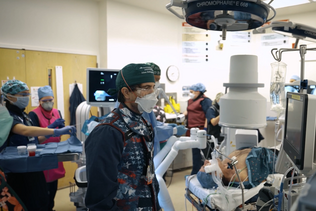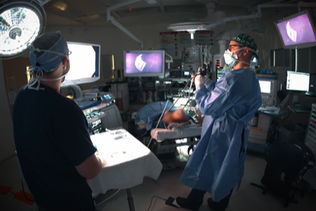There are approximately 20 months of required rotations distributed over the 3 year fellowship. The program aims for flexibility in scheduling, but generally tries to front-load clinical work. Typically, fellows have 10 months, 6 months, and 4 months of required rotations in their first, second, and third years, respectively. See Typical 3-year training schedule.
- Critical care medicine at Mary Hitchcock Memorial Hospital (MHMH): 9 months of critical care medicine are scheduled as 4-week blocks spread over the 3 years of fellowship training. Fellows rotate through the medical, surgical, and neurologic intensive care units. These rotations provide fellows with experience in managing a broad range of critically ill patients along with abundant opportunities to perform a variety of invasive procedures. The fellows’ responsibilities include supervision of house staff in the assessment and management of critically ill patients; provision of immediate consultative services to seriously ill inpatients on medical and surgical services and in the emergency ward; and serving as the initial gatekeeper for intensive care services, including handling telephone requests from outside physicians regarding transfer into the ICU. All ICU coverage is in-house. We have eliminated all 24 hour shifts with a night coverage system.
- Inpatient pulmonary consultation service at MHMH: Pulmonary training includes 4 months on the inpatient consultation service at MHMH. The primary goal of the inpatient pulmonary rotation is to develop the skills necessary for the diagnostic assessment and medical management of complex pulmonary disorders in hospitalized patients. On this service, the fellow is responsible for performing all new inpatient and emergency department consultations at MHMH, along with interpretation of PFTs and any necessary inpatient procedures. The fellow also receives urgent outpatient and outside provider calls and gives advice appropriately. Additionally, urgent outpatient evaluations and procedures are performed by the fellow with attending supervision.
- Inpatient pulmonary consultation service/critical care medicine at Veterans Administration Medical Center (VAMC): 3 months of training occurs at the Veterans Administration Medical Center in White River Junction, Vermont. The VAMC also affords fellows the opportunity to supervise house staff in a 7-bed combined medical-surgical intensive care unit, while simultaneously affording opportunities for both inpatient and outpatient consultations and procedures.
- Interventional pulmonology (IP): Fellows spend 2 months on the IP service where they gain experience in the evaluation and treatment of patients with lung cancer and pleural disease. Fellows have the opportunity to perform advanced procedures, such as endobronchial ultrasound (EBUS), rigid bronchoscopy, navigational/robotic bronchoscopy, placement of airway stents, debulking of tumors, tunneled pleural catheters, and percutaneous tracheostomy.
- Cystic fibrosis: Dartmouth Hitchcock Medical Center is the designated CF center for the state of New Hampshire. During the CF rotation, fellows will care for hospitalized CF patients and participate in the multi-disciplinary CF clinic.
- Airway management: This is a 2 week rotation in the OR supervised by members of the Department of Anesthesiology. The goal is to provide a “jump start” for fellows’ airway management skills.
- Long-term ventilator facility: A 2 week rotation at the Hospital for Special Care in New Britain, Connecticut, will take place during a fellow's third year. During this rotation, fellows will be directly involved in the management of patients with chronic ventilator dependency.

